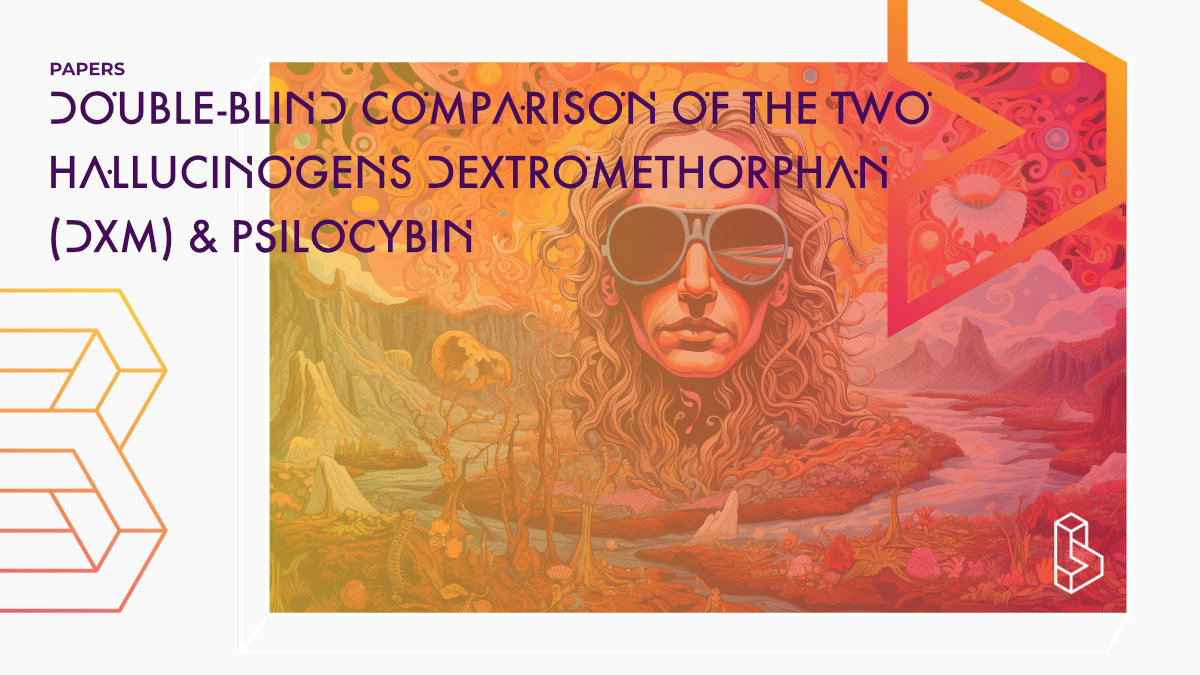This double-blind experimental study (n=20) compares the effects of high-dose dextromethorphan (DXM; 400mg/70kg) to psilocybin (10, 20, 30mg/70kg) under conditions typical of therapeutic psychedelic trials. DXM and psilocybin showed increases over placebo in ratings of experiences predictive of psychological benefit at 1 week. However, psilocybin’s effects were dose-dependent and more favourable, while DXM had poorer physical tolerability.
Abstract of Double-Blind Comparison of the Two Hallucinogens Dextromethorphan (DXM) & Psilocybin
“Rationale: N-methyl-D-aspartate receptor-mediated dissociatives and serotonergic hallucinogens are being increasingly used in therapeutic interventions that involve nonordinary states of consciousness and may represent a unique mental health paradigm wherein pharmacologically induced experiences are conducive to psychological well-being.
Objective: The aim of this study was to further understand how the phenomenological and health-promoting effects of high-dose dextromethorphan (DXM) compared to psilocybin in the same participants when administered under experimental conditions that are typical of therapeutic psychedelic trials.
Methods: Single, acute oral doses of DXM (400 mg/70 kg), psilocybin (10, 20, 30 mg/70 kg), and inactive placebo were administered under double-blind and psychologically supportive conditions to 20 healthy participants with histories of hallucinogen use. Ratings of personal meaning, spiritual significance, psychological challenge, and psychological insight attributed to acute drug experiences were assessed 7 h (at session end) and 1 week after each drug administration. Persisting psychological effects were assessed 1 week after each drug administration.
Results: High-dose DXM and psilocybin produced similar increases over placebo in ratings of drug experience that was predictive of psychological benefit at 1 week, even when expectancy effects were minimized. These effects tended to favor psilocybin in a dose-dependent manner and were limited by poor physical tolerability for DXM.
Conclusions: This analysis suggests the utility of exploring clinical applications of dissociatives that occur within the supportive contexts that are characteristic of psychedelic research and that prioritize the optimization of psychologically valuable drug experiences.”
Authors: David S. Mathai, Samantha Hilbert, Nathan D. Sepeda, Justin C. Strickland, Roland R. Griffiths & Albert Garcia-Romeu
Summary of Double-Blind Comparison of the Two Hallucinogens Dextromethorphan (DXM) & Psilocybin
Classic serotonergic hallucinogens and N-methyl-D-aspartate receptor-mediated dissociative hallucinogens are being explored as groundbreaking treatments for depression and other psychiatric conditions. These drugs may share downstream mechanisms of action that involve changes in cortical network activity and glutamate-driven neuroplasticity.
Efforts have been made to clarify the psychological effects of classic psychedelics, such as mystical-type experiences, but not all participants who achieve clinical benefit have these canonical experiences. It is, therefore, necessary to categorize drug experiences in ways that are less circumscribed but nonetheless indicative of personal value.
This report presents new data and mixed-methods analyses from a previously conducted double-blind, within-subjects crossover study where hallucinogen-experienced volunteers received doses of oral placebo, DXM, and psilocybin. DXM produced greater disembodiment and physical discomfort than psilocybin.
Find this paper
https://doi.org/10.1089/psymed.2023.0035
Paywall | Google Scholar | Backup | 🕊
Cite this paper (APA)
Mathai, D. S., Hilbert, S., Sepeda, N. D., Strickland, J. C., Griffiths, R. R., & Garcia-Romeu, A. (2023). Double-Blind Comparison of the Two Hallucinogens Dextromethorphan and Psilocybin: Experience-Dependent and Enduring Psychological Effects in Healthy Volunteers. Psychedelic Medicine.
Study details
Compounds studied
Psilocybin
Topics studied
Healthy Subjects
Study characteristics
Original Re-analysis
Active Placebo
Double-Blind
Within-Subject
Randomized
Participants
20
Humans
Authors
Authors associated with this publication with profiles on Blossom
Roland GriffithsRoland R. Griffiths is one of the strongest voices in psychedelics research. With over 400 journal articles under his belt and as one of the first researchers in the psychedelics renaissance, he has been a vital part of the research community.
Institutes
Institutes associated with this publication
Johns Hopkins UniversityJohns Hopkins University (Medicine) is host to the Center for Psychedelic and Consciousness Research, which is one of the leading research institutes into psychedelics. The center is led by Roland Griffiths and Matthew Johnson.
Compound Details
The psychedelics given at which dose and how many times
Psilocybin 10 - 30mg | 3x
Linked Research Papers
Notable research papers that build on or are influenced by this paper
Double-blind comparison of the two hallucinogens psilocybin and dextromethorphan: similarities and differences in subjective experiencesThis double-blind, placebo-controlled study (n=20) with psilocybin (10, 20, 30mg/70kg) and DMX (400mg/70kg) finds very similar subjective effects between the two drugs. The visual, mystical, and insightful effects were more pronounced with psilocybin, disembodiment with DMX.
Subjective features of the psilocybin experience that may account for its self-administration by humans: a double-blind comparison of psilocybin and dextromethorphan
This double-blind, placebo-controlled study (n=20) investigated which features of psilocybin may account for its high rates of non-medical use, by comparing it to dextromethorphan (DXM). Nine subjective effects of psilocybin were linked to its reinforcing effects (i.e. motivation to use again), which were: liking, visual effects, positive mood, insight, positive social effects, increased awareness of beauty, amazement, meaningfulness, and mystical experience.
Double-blind comparison of the two hallucinogens psilocybin and dextromethorphan: effects on cognition
This double-blind, placebo-controlled study (n=20) with psilocybin (10, 20, 30mg/70kg) and DMX (400mg/70kg) finds no global cognitive impairment. The study does find (for both drugs) effects on psychomotor performance, working memory, episodic memory, associative learning, and visual perception.
Linked Clinical Trial
Effects of Hallucinogens and Other Drugs on Mood and PerformanceThis non-treatment study will investigate the effects on mood and performance caused by hallucinogens and other psychoactive compounds.

